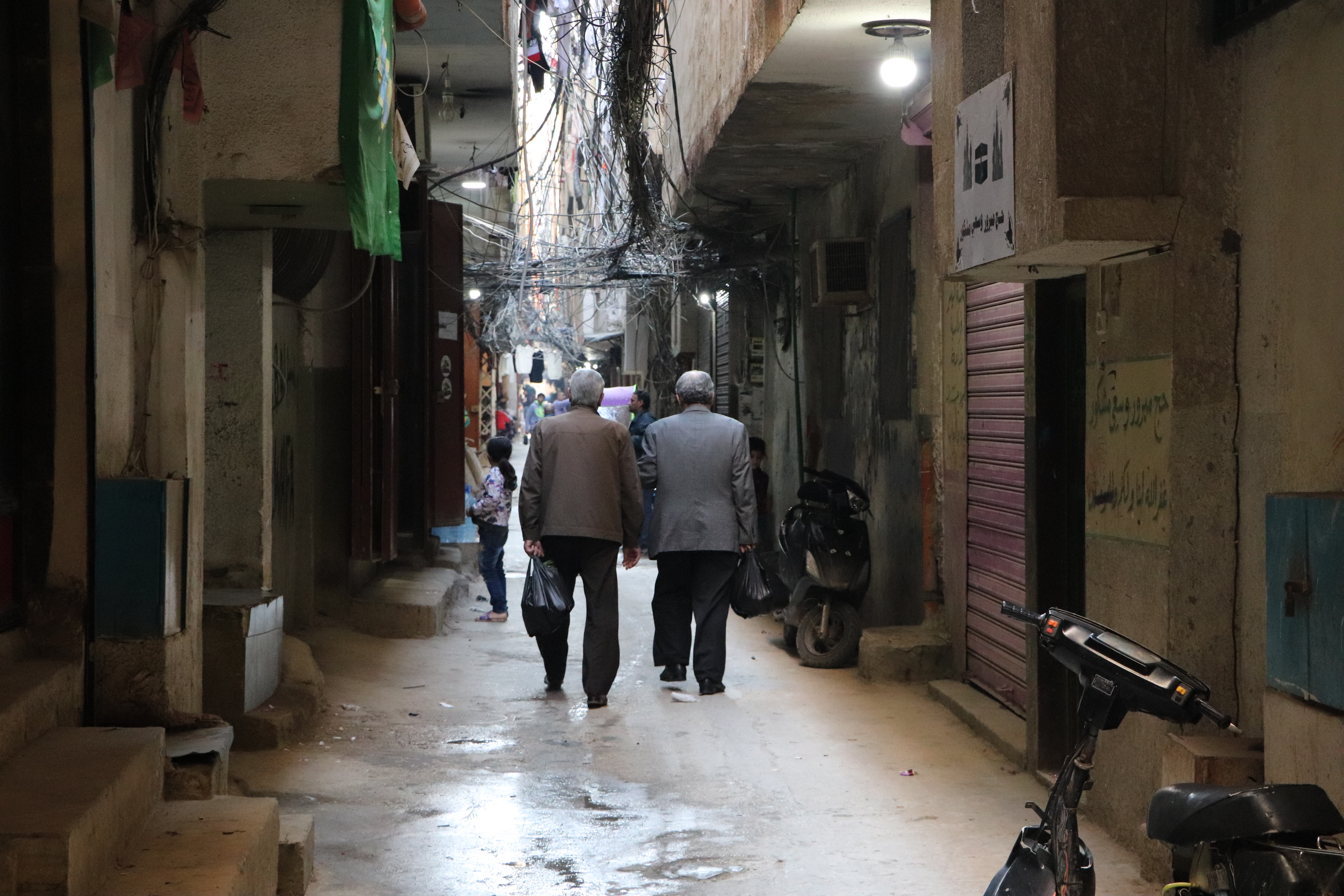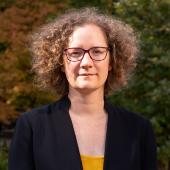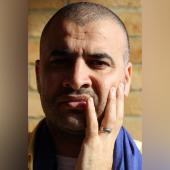Baddawi Camp Lab, Lebanon
Lab, IF-LAB-0001

Photo – Poetry Publication
In October 2020, Yousif M. Qasmiyeh spoke and read his poetry on ‘Camps, Refugees and Ruination’ at Wagner University, New York.
November 2020: Yousif M. Qasmiyeh was invited to read the poetry of Seamus Heaney and to discuss “Heaney in translation and the open nature of his incomplete rhymes, before recalling his own first encounter with Heaney in a Palestinian refugee camp in Lebanon” as part of the Institute of Irish Studies online event: Human Chain: Poets on the Poetry of Seamus Heaney. You can watch Yousif and other poets here.
On 21 January 2021, Prof. Elena Fiddian-Qasmiyeh offered a seminar at the University of Washington, on ‘Shifting the Gaze: Southern-led Humanitarian Responses to Displacement.’
In February 2021, Yousif M. Qasmiyeh’s poetry collection, Writing the Camp, was published by Broken Sleep Books. Writing the Camp has been selected by The Poetry Book Society as the PBS Spring Recommendation for 2021, and includes poems commissioned as part of the Imagining Futures project.
https://imaginingfutures.world/labs/baddawi-lebanon/
Synopsis and Position
The Baddawi Camp Lab approaches egalitarian archiving practice through developing the hosts’ existing engagement with ruination (Qasmiyeh 2019) and rhizoanalysis (Fiddian-Qasmiyeh 2019a/b) and building on materials shared with the Tanzania Lab team. The Lab provides opportunities to reflect on a series of historical, social and conceptual connections between Baddawi Camp and some of the themes and sites explored by the Tanzania Team, especially with regards to forms of archiving multiple narratives and sites of remembrance. This has already been explored following a pilot visit in July 2019, with a number of gatherings and creative writing workshops scheduled for 2021-2022. With a view to building synergies with the Tanzanian sites, the Baddawi Camp Lab will facilitate 3 intersecting case-studies: 1) Travelling and stagnant ruination in the colonial prisons in Tanzania and the UNRWA and PLO and bomb shelters in Baddawi Camp, 2) Tracing the multiple past, present and (imagined) future connections between Baddawi Camp and diverse people and places from different regions of Africa, 3) Trauma and Space in Baddawi Camp. These cases act as catalysts to building our approach for a cross-context methodology for egalitarian archiving and testing its transferability across sites and moments, and is important for the Lab in order to prioritise modes of what we can term ‘South-South engagement’.Objectives and Methods
The lab seeks to:- Understand the traveling and stagnant ruination in the colonial prisons in Tanzania and the UNRWA and PLO and bomb shelters in Baddawi Camp through interviews, oral histories, (popular and institutional) archival analysis, creative writing, and photography. This case-study will examine the past, present and futures/legacies of the UNRWA and PLO bomb shelters in Baddawi Camp, placing them into conversation with the team’s analysis of colonial prisons in Tanzania. We are particularly interested in how these sites (shelters and prisons) have been transformed into places of ruination whereby pasts and presents continuously meet and diverge as they ponder their respective futures.
- Our second case-study focuses on the area of the Upper Camp where the UNRWA schools (and hence bomb shelters) are situated, and which is also Hay al-Muhajarin: the neighbourhood which is home to Palestinians of African descent who were displaced (mainly from al-Nabatieh Camp) to Baddawi Camp in the 1970s. This case study explores the multiple past, present, and (imagined) future connections between Baddawi Camp and diverse people and places from different regions of Africa. It is widely acknowledged that Afro-Palestinians/Black Palestinians are a particularly under-researched group of Palestinians (writ large and including in Lebanon), and this case-study will ensure that the diverse constituents of the camp and/as archive are at the forefront of our analysis. A further link with Africa, and specifically with Tanzania, is its role in hosting Palestinian intellectuals and leaders in exile from the 1960s. In this case study, we, therefore, aim to engage critically with the ways that displacement inheres other displacements by focusing on multiple and overlapping histories.
- Trauma and Space in Baddawi Camp. This case-study relates to the Tanzanian team’s reference from their pilot to the “trauma-filled abandoned cotton fields” and explores how and why certain spaces historically associated with violence and trauma have come to form the foundations of the contemporary refugee camp and its neighbouring area (Jebel al-Baddawi). In addition to the UNRWA and PLO bomb shelters, we will examine how liminal spaces on the threshold of the camp – such as the Zeitun (olive) groves, Jebel (hill/mountain) groves, and football pitches – have been transformed by both Palestinian and Lebanese publics into old-new spaces of memory and imagined futures.
Workshops and Events
In June 2020, Prof. Elena Fiddian-Qasmiyeh and Yousif M. Qasmiyeh presented the Baddawi Camp Lab’s work, under the title ‘The Camp as Archive: Baddawi Camp, North Lebanon,’ at the inaugural ACU Peace and Reconciliation Network Conference (Stellenbosch University).In October 2020, Yousif M. Qasmiyeh spoke and read his poetry on ‘Camps, Refugees and Ruination’ at Wagner University, New York.
November 2020: Yousif M. Qasmiyeh was invited to read the poetry of Seamus Heaney and to discuss “Heaney in translation and the open nature of his incomplete rhymes, before recalling his own first encounter with Heaney in a Palestinian refugee camp in Lebanon” as part of the Institute of Irish Studies online event: Human Chain: Poets on the Poetry of Seamus Heaney. You can watch Yousif and other poets here.
On 21 January 2021, Prof. Elena Fiddian-Qasmiyeh offered a seminar at the University of Washington, on ‘Shifting the Gaze: Southern-led Humanitarian Responses to Displacement.’
In February 2021, Yousif M. Qasmiyeh’s poetry collection, Writing the Camp, was published by Broken Sleep Books. Writing the Camp has been selected by The Poetry Book Society as the PBS Spring Recommendation for 2021, and includes poems commissioned as part of the Imagining Futures project.
Activities
- On 11 June 2020, Yousif M. Qasmiyeh’s poem, ‘The Bomb Shelter,’ which was written as part of the IF Baddawi Camp Lab which he jointly leads, was published on Refugee Hosts and can be read here: https://refugeehosts.org/2020/06/11/the-bomb-shelter/.
- On World Refugee Day 2020, Prof. Elena Fiddian-Qasmiyeh and Yousif M. Qasmiyeh were invited to published an OpEd for the Association of Commonwealth Universities, titled “The Camp as Archive: Refugees and ruins in Baddawi camp,” which is available to read here: https://www.acu.ac.uk/news/the-camp-as-archive-refugees-and-ruins-in-baddawi-camp/.
- Yousif M. Qasmiyeh: An invited presentation on archiving displacement and the camp, at Wagner University in November 2022
- Yousif M. Qasmiyeh: Invited contribution to a high-level Goethe Institute event on Translation and Activism in which I discussed activism and translation in relation to archiving displacements in Baddawi Camp (summer 2022)
- Yousif M. Qasmiyeh: Invited contribution to a UCL-based Roundtable on decolonising refugee related research (July 2022); this is the basis of a peer reviewed article which has been accepted by the Journal of Humanitarian Affairs (details to follow once published)
- Yousif M. Qasmiyeh: I was invited to contribute to a Special Issue of the Journal, Decolonization of Criminology and Justice, titled ‘Who is telling the story? ‘Refugee’ Narratives: voice, image, words’ - my contribution (based on my work with IF) has been through peer review and has been accepted for publication. Details to follow once published.
- Yousif M. Qasmiyeh: appointed as Poet in Residence at Distinctive Collections (the Cuban Heritage Collection and the Department of Special Collections) of the University of Miami Libraries (unable to accept due to other commitments)
- Yousif M. Qasmiyeh: Writing the Camp poetry collection (an IF output) was shortlisted by the Royal Society of Literature for the 2022 Ondaatje Prize, and continued to receive critical acclaim more broadly, including a recent review by Prof Mariangela Palladino in Wasafiri.
- Yousif M. Qasmiyeh: Eating the Archive (an IF output) published by Broken Sleep Books in February 2023
- Eating The Archive by Yousif M. Qasmiyeh is a poetic counter-archive of the refugee camp. It visibilises what is otherwise rendered invisible in the official archives. Qasmiyeh’s poems “can see,” emerging powerfully from prolonged waiting in the camp, where “waiting is seeing”. This important book is an invitation to think in the cracks of the walls, where cracks and the spaces of in-betweenness are also witnesses for wounded names and faces – a space where the poet can breathe in his mother tongue by breathing with his mother. Eating The Archive is an open gateway to encounter the camp that is lost in conventional ethnographic observations and fieldwork.
- In Eating the Archive, Yousif M. Qasmiyeh offers object lessons on what is — and isn’t — graspable: a photograph, a frying pan, a gun, language, time, prayer, a mirror, a razor, a divination bowl. Who is the author of the archive? The poet bears witness, to what lives and dies right in front of him, and inside him. He does this by writing, 'a trace still as it is still.' To read Yousif M. Qasmiyeh is to step into a caesura: a place where presence and absence engage with attention; a place where erasure speaks back; a camp of voices that refuse to be forgotten or silent.
- Federico Garcia Lorca suggested that every poet has a wound, but what if, as Yousif M. Qasmiyeh writes in his new book Eating the Archive, ‘the wound is continuously postponed’? Enter memory lodged with shrapnel, where to view anything culminates in breathing through time that ‘cuts through words’. This vast and beautifully parablesque second collection by Qasmiyeh is a poetics of rupture, of cracks and fissures. Here we find a writer so philosophically alert to the crossing of danger that is ‘experience’. With a knack for echolalic narrative, Qasmiyeh is able to both fragment and distil time, looping back to remember and re-remember what happened to the author and his family from their time in Lebanon’s Baddawi refugee camp. Eating the Archive offers us a densely physical consideration of language—the difficulties of writing to name anything that comes from the archive of mind and body through to the ‘limb of a word’—where writing itself is risk. Qasmiyeh is one of the most exciting new writers of the twenty-first century.
- Qasmiyeh’s camp is a space for reckoning. In his poems, home is a tomb and the present is situated in the afterlife of history, as he calls it, where there is “No one to question our dying. No one to shed a tear for what is happening behind walls. Thin, flawed walls built for the temporary in mind.” The field some have begun to call the literature of displacement is where the world’s most important writing is taking place and Qasmiyeh’s second collection confirms that he is one of its brightest rising talents.
- Yousif M. Qasmiyeh: One of the poems written as part of this year’s work on the Baddawi Camp Lab, ‘The Camp is a Bait for Time,’ was nominated by the editor of the literary journal in which it first appeared, for the 2023 Forward Prize.
- Yousif M. Qasmiyeh: IF-related poems published in literary magazines including ‘The Camp is a Bait for Time’ published in Poetry London, and ‘Holy Water’; ‘Haram’ published in New England Review, the latter for a special issue on poets from Lebanon.
- Yousif M. Qasmiyeh: Invited to contribute to a podcast on ‘Waiting’ produced by Cornell’s Migrations team, alongside Professors. Shahram Khosravi and Elena Fiddian-Qasmiyeh. Link to podcast available online
- Yousif M. Qasmiyeh: Collaboration between UK and US based poets on the “Postcards from the Archive” project (Rothermere American Institute), resulting in the publication of Yousif’s poem ‘Mother Talk’ in response to Roy Kiyooka’s archiving of his mother’s voice, as an alternative history, in his book of the same title.
- Yousif M. Qasmiyeh: DPhil thesis submitted to the Faculty of English Language and Literature, University of Oxford titled ‘The Archive, Time and the Body in Refugee Writing in Arabic and English’ – in the thesis I develop part of my IF work pertaining to archiving the intimate in displacement.
- Elena Fiddian-Qasmiyeh: appointed as Inaugural Distinguished Presidential Goizueta Professor, Cuban Heritage Collection, University of Miami Libraries (unable to accept due to other commitments)
- Elena Fiddian-Qasmiyeh and Yousif M. Qasmiyeh in conversation on gender and archiving displacements as part of the UCL MSc option on Gender, Generation and Forced Migration (Nov 2022)
- Elena Fiddian-Qasmiyeh and Yousif M. Qasmiyeh: chapter submitted for publication in the forthcoming Handbook of South-South Migration, which discusses archiving and South-South research vis-à-vis displacement, such as that we are exploring in the Baddawi Camp Lab. open access available online
- Elena Fiddian-Qasmiyeh and Yousif M. Qasmiyeh: full draft of a photo-poetic book prepared with Saiful Huq Omi & the Baddawi Camp Cultural Club, to be submitted to and published by Broken Sleep Books in August 2024. Title and authorship = The Southern Eye, by Qasmiyeh, Fiddian-Qasmiyeh and Omi.
- Elena Fiddian-Qasmiyeh and Yousif M. Qasmiyeh: UCL-Cornell seed-funding for a collaboration with two colleagues at Cornell specifically on the topic of refugee-led research (such as that embodied in the Baddawi Camp Lab). Workshops and events discussing and showcasing the Lab’s work will be co-convened during a series of activities. Further details will be provided in due course.
https://imaginingfutures.world/labs/baddawi-lebanon/
Loading...

